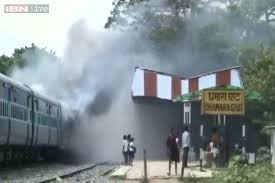
The 'kanwarias' (devotees of Lord Shiva) were on the tracks after alighting from the Samastipur-Saharsa passenger when they were run over by the Saharsa-Patna Rajyarani Express travelling at 80 kmph, officials said.
Additional Director General of Police (ADG) Law and Order S K Bharadwaj told PTI that 35 pilgrims were killed.
A senior railway official also said that the toll could be around 35, but refused to be quoted.
Railway Board Chairman Arunendra Kumar said the train was not supposed to halt at Dhamara Ghat and was given clearance to pass through the area but the devotees were on the tracks thinking they could stop the train.
Though the driver applied emergency brakes, it was too late by then, he said, adding an internal inquiry has been ordered into the incident.
The pilgrims were going to nearby Katyani Sthan temple to offer 'jalabhishek' to Lord Shiva on the fourth and final Monday of the holy month of Shrawan when the mishap took place.
Soon after the accident, local people attacked the train driver.
Superintendent of Police S K Jha told PTI over phone that the engine of the Samastipur-Saharsa passenger train and an AC coach of Saharsa-Patna Rajyarani Express were set on fire by the enraged locals.
The two drivers of the express train, Rajaram Paswan and Sushil Kumar Suman, were traceless and their mobile phones switched off, ECR CPRO Amitabh Prabhakar said.
However, the Railway Board Chairman said the driver was safe without specifying.
He said it was a case of trespassing as the pilgrims were illegally trying to cross the tracks.
Minister of state for Railways Adhir Ranjan Chowdhury said that the express was travelling at a speed of 80 km per hour when the accident occurred.
He said although relief trains carrying doctors and nurses were sent from Saharsha and Barauni, they could not reach the spot as the law and order situation there was not conducive because of protests by angry people.





Comments
Add new comment